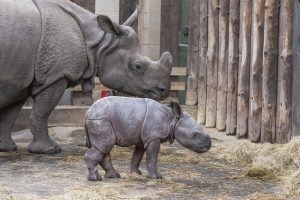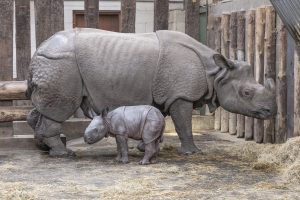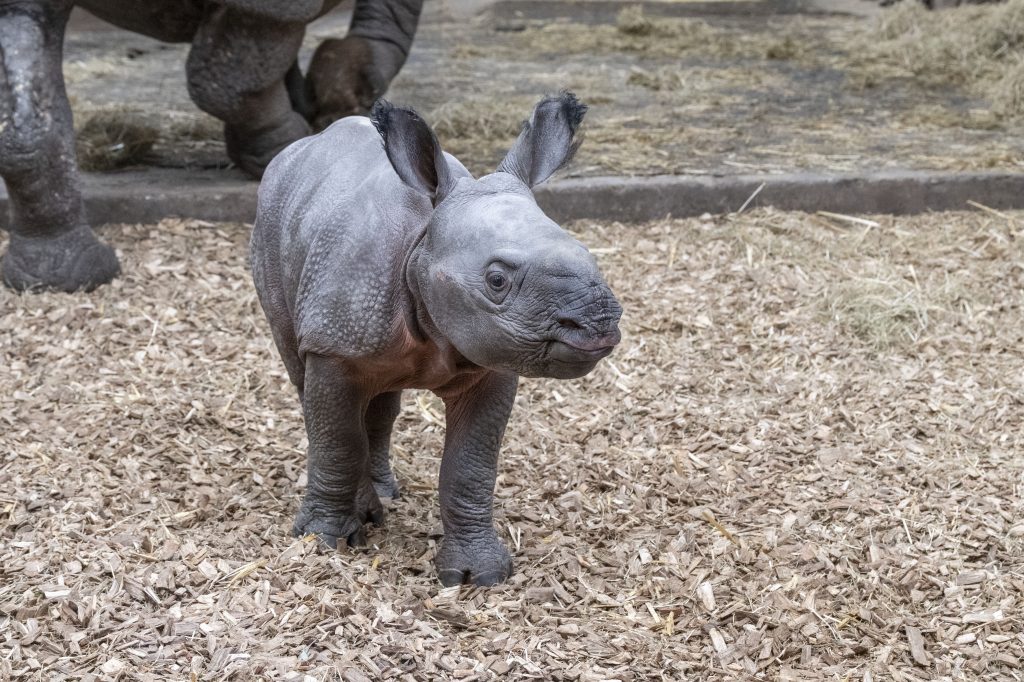A RARE rhinoceros calf has been born at the West Midlands Safari Park in Bewdley.
The female baby is only the second successful Indian rhino birth at the park in its 52-year history, following the calf’s half-brother who arrived in 2020.
The birth to first time mum Sunanda took place last week under the watchful eye of the keepers who said mum and baby were both doing really well.
The labour did not initially go to plan and staff had to step in to lend a helping hand.
Veterinary nurse, Sarah Smith, said, “The wildlife and veterinary teams are well-rehearsed with rhino births, but each birth presents its own journey.
“Sunanda didn’t follow all of the usual steps during the weeks leading up to the birth, but our experienced team were able to spot the initial signs of labour during the night.”

Picture by Matthew Lissimore. s
A long, restless night monitoring CCTV and morning checks confirmed labour was progressing but then, closer inspection showed back feet visible, meaning it would be an ‘abnormal delivery’.
Breech births present many difficulties – research shows a large number require intervention and usually end in calf mortality. They can also endanger the mum’s life so staff knew they only had a short time window to act.
“We were able to apply calving ropes to the calf’s hind legs and assist Sunny with her contractions and help birth the calf.”
Expecting the worst outcome, staff were busy fighting to save Sunanda and were delighted to see the calf was alive and moving.
“Sunanda is showing the initial signs of being a perfect new mum, despite the difficulty she had just faced, and is continuing to raise her first calf in textbook fashion.
“We’re so proud of her and the team.”
‘Vulnerable’
Indian rhino, aka the greater one-horned rhino, are classed as ‘vulnerable’ to extinction by the IUCN (International Union for the Conservation of Nature), so every birth is a boost to the species’ conservation and survival.
The Indian rhinos are part of an EEP (EAZA Ex-situ Programme), a collaboration of European wildlife parks to work together to help preserve endangered species.
Lisa Watkins, Head Keeper of Ungulates, said everyone was thrilled the beautiful female Indian rhino calf had been born at the park.
“The birth is the first for the European EEP population this year and in fact the first to be born in the last 15 months, so this makes it even more special.
“The team are absolutely over the moon that both mum and calf are doing so well.”

Picture by Matthew Lissimore. s
After such a traumatic entrance into the world, staff said they were taking each day as it comes.
Both mum and calf may have access to the outside paddock when the weather is suitable so visitors over the next few weeks could catch a climpse of them.
The plan is to mix them both with Seto – the other female rhino – in the near future.
“We hope to mix them both with Seto, our other female Indian rhino in the near future. Sunny is taking everything in her stride and the team are so proud of her.”
Where the rhinos are found
The rhinos are found in India and Nepal but face threats such as poaching, habitat destruction and conflict with humans – in the 19th century they were almost hunted to extinction.
The authorities of India and Nepal, along with independent conservation organisations, have worked hard to protect the rhinos and now there are believed to be about 4,000 left in the wild.
West Midlands Safari Park supports and donates annually to Save the Rhino International which work to protect all five types of rhinos in the wild.
The baby girl is yet to be named, but keepers will pick a name beginning with the letter ‘N’, as all babies born at the park in 2025 all have names with that letter.
The calf brings the number of Indian rhinos at the Park up to four, which includes mum, Sunanda, female Seto and male, 17-year-old Rap, who is father to the youngster.
Visit: wmsp.co.uk for more information.












